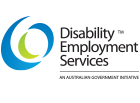
More Australians are requiring digital skills, such as the ability to quickly learn how to use office software, in order to enter the workforce and find fulfilling, sustainable employment.
A 2021 report by RMIT University found that 87% of jobs in Australia require digital literacy skills, while four in five businesses think it’s a priority to adopt new technologies to achieve business goals, a need which will only increase. However, 1 in 4 Australians reported feeling they didn’t have the skills required for the jobs of tomorrow.1
This International Literacy Day (8 September), employment services provider atWork Australia is shining a light on the power of digital literacy in today’s workforce to enable people to thrive at work.
In the past, digital literacy typically encompassed just basic computer and word processing skills. Today, however, employees are required to seamlessly navigate a variety of platforms and devices.
While the COVID-19 pandemic forced many people to upskill in new technologies such as video conferencing, some remain at risk of being left behind in our increasingly digital world. Charity Good Things Foundation reports that 1 in 4 people in Australia are digitally excluded,2 with those most at risk including those who are unemployed, older Australians and those on lower incomes.
atWork Australia has noticed a very distinctive trend highlighting the growing need for digital skills required for employment across a range of industries. Job vacancies requiring computer literacy almost doubled from 2020 to 2021 (+98%), then did double in 2022 (+129%) and again in 2023 (+103%) and trends for this year are looking to have a similar result.
We have also seen a broadening of the types of jobs that now require a level of computer literacy where that may not have been the case in years gone by. For example, a canteen assistant now commonly requires proficiency skills across the Microsoft Office suite whilst a factory assembly worker commonly needs to have at least basic data entry skills.
“Digital literacy skills are essential in the modern workforce, across a wide variety of roles – whether you’re working in administration in an office, or operating equipment in a warehouse,” said Shaun Pianta from atWork Australia.
“We help Australians increase their digital literacy by providing training and short courses for those seeking employment. We also encourage those looking for work to practice using technology at home – for example, by catching up with a friend on a Zoom call, rather than the phone – to increase their understanding.”
atWork Australia client Glenn, aged 62 from Mowbray Tasmania, is a dedicated delivery driver who has demonstrated remarkable resilience in overcoming personal and professional barriers after experiencing a series of life-altering challenges. Following the loss of his wife to cancer, Glenn faced a severe heart injury that threatened his ability to work.
Despite these setbacks, Glenn’s determination to rebuild his life led him to atWork Australia, where he received both emotional and practical support, including digital assistance to help him secure employment. “Without the unwavering support of atWork Australia, I honestly don’t know where I’d be right now,” Glenn reflects.
“My job coach, Shannon, has been nothing short of fantastic. She helped me update my resume, reactivate my accounts, and navigate all the necessary paperwork. Learning to use scanners and handle other digital tools was pivotal in my journey back to work. Her dedication and expertise in managing these digital processes were crucial in getting me back on my feet.”
The support provided by atWork Australia extended beyond traditional job placement. Glenn was guided through the complexities of digital job application systems, including updating his cover letter and resume, managing digital IDs and using modern scanners for work-related tasks. These tools not only facilitated his job search but also equipped him with valuable skills for his role at Australia Post as a delivery driver, where he now efficiently uses a variety of digital devices for his daily role including scanners for parcel distribution.
Glenn’s story highlights the transformative power of digital literacy in overcoming employment barriers and highlights the essential role of specialised employment services in supporting individuals through modern workplace challenges.
To access atWork Australia’s digital skills and support hub, please visit: https://www.atworkaustralia.com.au/digital-skills-and-services/
References
- RMIT Online. Ready, set, upskill: Effective training for the jobs of tomorrow. 2022. https://online.rmit.edu.au/insights/2021?gclid=CjwKCAjwvMqDBhB8EiwA2iSmPNp7fG4Tku1VgcA_2y6moJp-KbVGgL94065BIw8JG9Q_k8C5DiNYAxoCF_oQAvD_BwE. Accessed 27 August 2024.
- Good Things. Our impact. https://goodthingsaustralia.org/. Accessed 27 August 2024.


